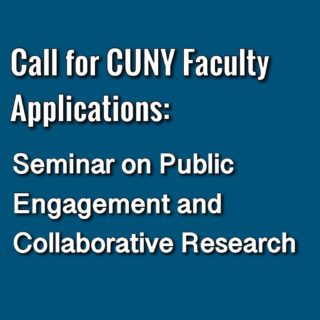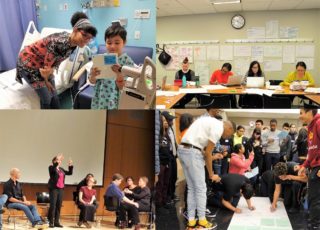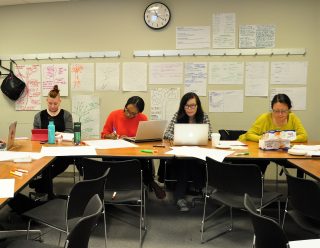We are thrilled to announce that the Center for the Humanities at the Graduate Center, CUNY has received a grant of over half a million dollars from The Andrew W. Mellon Foundation to support CUNY faculty, students, and community partners from around the city as they create innovative public humanities projects through the Seminar on Public Engagement and Collaborative Research.
This initiative brings together a cross-disciplinary cohort of faculty, graduate and undergraduate students; visual, performing, and new media artists; community organizers and cultural practitioners from around the city to expand the ways in which scholarly research, art creation, and activism can work in tandem to connect people and causes across academic and non-academic sectors. The cohort develops multifaceted, public-facing projects that offer new ways of understanding and solving urgent social issues.
“Each expansive project is authored collaboratively by participants and, in the process, changes minds and lives, builds community, models innovative scholarship and pedagogy, and deepens the meaning and relevance of humanistic inquiry to practical and intellectual challenges facing the university, the city, and the world.”
—Kendra Sullivan, Associate Director of the Center for the Humanities
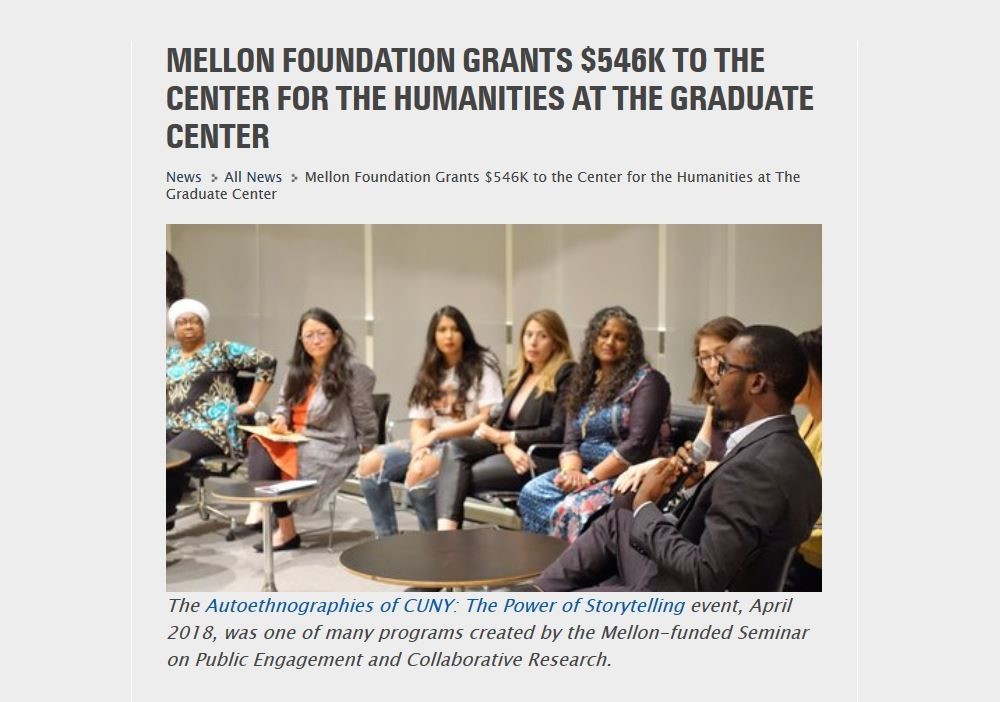
Guiding Questions and Values
Some of the questions that drive this initiative include: What is the responsibility of a public university? How do we work honorably with the publics within and beyond our classrooms to produce and circulate knowledge that addresses critical and practical problems while creating cultural value across and within diverse communities? To whom is our research valuable and how can we best connect with those publics?
Some of the values guiding this work include:
- Collaboration. We foster equitable partnerships with individuals and institutions within and outside the university. These relationships are founded on trust, time, and mutual support.
- Social Justice. Our research supports reflection and action. It responds meaningfully to community-led social, environmental, and political justice movements.
- Dialogue. Our ideas evolve in concert with the concerns of our collaborative partners. We create and sustain conversation through creative, scholarly, and classroom activities.
- Sustained Engagement. Working on a two-year project arc affords the thoughtful development of project design, process, implementation, and reflection over time.
- Reciprocity. We employ participatory strategies to share our knowledge and resources with our partners and their publics.
- Creative Expression. Forms of critical and cultural production that build community such as storytelling, playwriting and performance, oral history, AR/VR, new media art, visual and installation art, exhibitions, video games, essays, editorials, poetry and public syllabi are central to our collaborative work.
Research Themes and Call for Participants and Fellows
We are currently seeking CUNY faculty and students to participate in the seminar who will bring innovative ideas and valuable knowledge to bear on three core research topics:
- "Blue Humanities"
- The Humanities and Public Discourse
- Urban Neighborhoods
These research topics are intended as springboards, not prescriptions. If you have other ideas, please reach out to us. To learn more about how we are broadly defining these themes, click here.
This is the 3rd, expanded iteration of the grant and will fund six faculty coleaders, three student teaching fellows, three student digital public fellows, and one student provost’s fellow in the public humanities. Applications for faculty coleaders and student teaching, digital publics, and provost’s in the public humanities fellowships are now open. Starting in fall 2020, there will be additional opportunities for adjunct teachers and researchers, independent study students at the graduate and undergraduate levels, and community partners to participate and develop projects. The initiative offers financial and logistical support as well as concrete resources for project development.
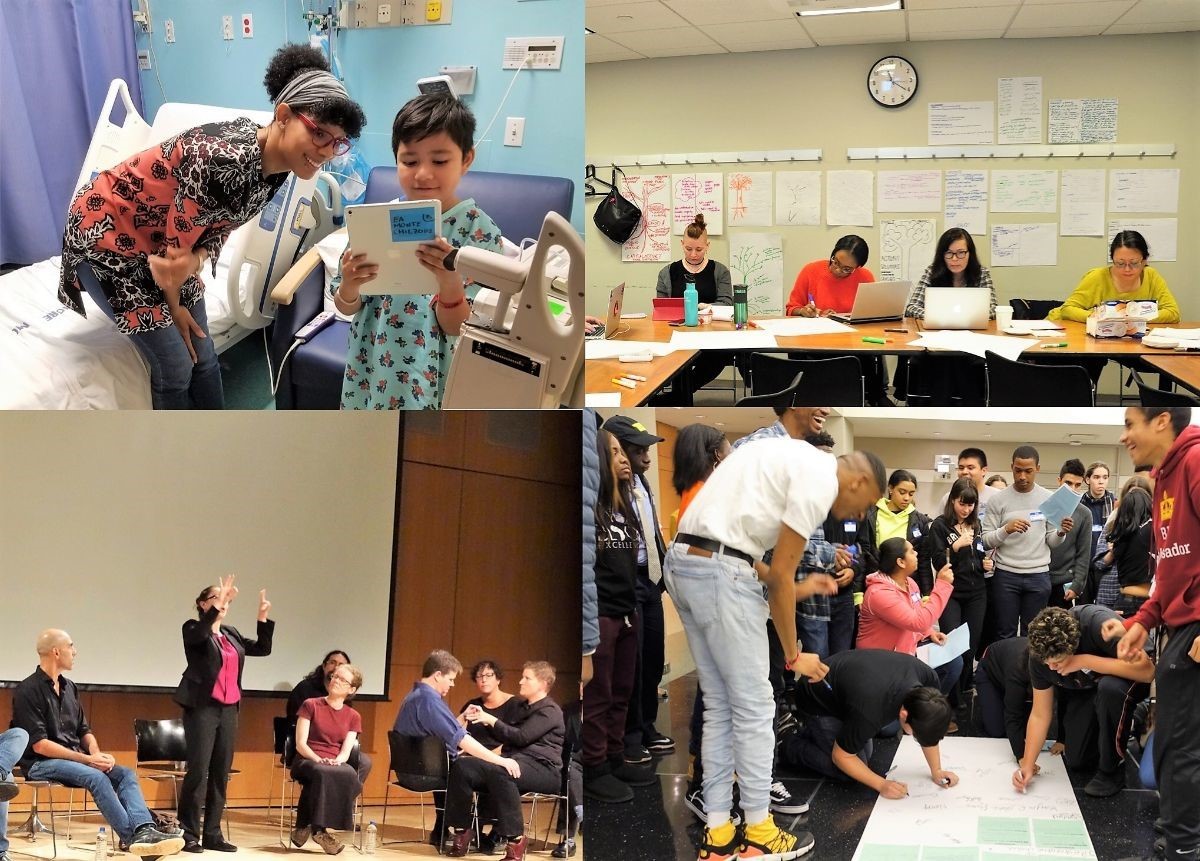
Click here to learn more about past seminar projects, including original theatrical productions, publications, podcasts, interactive websites, oral histories, and artworks addressing topics such as climate change and environmental justice, youth activism and inequities of the NYC public school systems, using virtual reality to help heal pediatric hospital patients, oral history archiving, dance writing, poetry and activism, and equitable housing.
Call for CUNY Faculty Applications Now Open
Deadline to Apply: Mon, Sep 30, 2019.
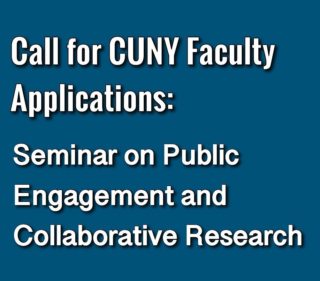
Applications Now Open for GC Doctoral Students: Teaching Fellows, Digital Publics Fellows, and Provost's Fellow in the Public Humanities
Deadline to Apply: Tue, Oct 15, 2019.
PROJECT TIMELINE & DEADLINES:
FALL 2019:
Information sessions (taking place in Room 9205 at the Graduate Center, CUNY):
Tuesday, September 10th, 4:15-6:15pm
Tuesday, October 1st (Student Fellowship Focus),11:45am-1:45pm
September 30th: Faculty Coleader applications due.
October 15th: Teaching Fellow/Digital Publics Fellow/Provost’s Fellow applications due.
November 8th: Faculty notifications sent out to applicants.
December 2nd: GC student fellowship notifications sent out to applicants.
SPRING 2020: Project officially launches; participants begin research and project design, professional development, and public humanities training intensives
FALL 2020–SPRING 2022: Community engagement, public pedagogy, workshops and practicums, and development of capstone projects.
SPRING 2021–SPRING 2022: Reflection, analysis, and documentation of ongoing projects, resulting in digital, new media, and print interfaces that model and analyze public scholarship for a wide readership.
Questions about this initiative, or about the application process can be sent to the Center for the Humanities at [email protected]
For further information about this seminar, please visit our website here for descriptions of the research themes for this grant cycle, and details on application requirements and deadlines.

